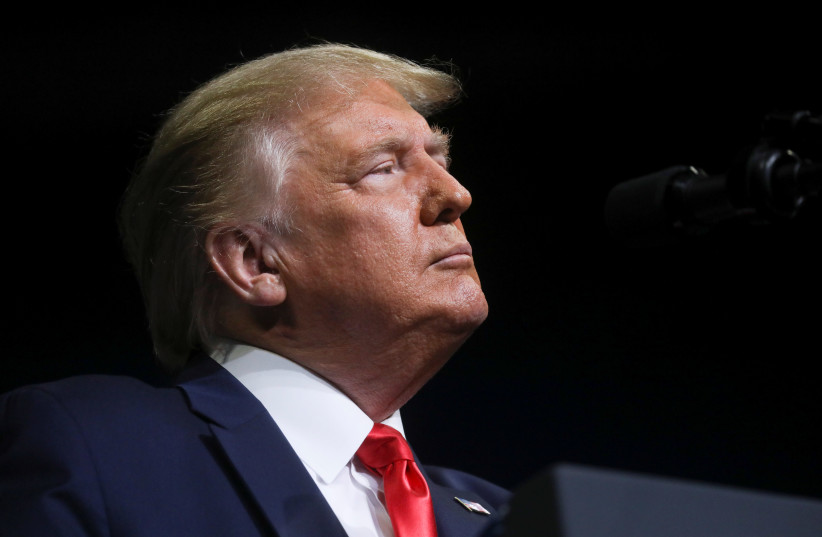The peace team plans to discuss what to do if Alternate Prime Minister and Defense Minister Benny Gantz and Prime Minister Benjamin Netanyahu do not find common ground.

US President Donald Trump is poised to make a final decision on Tuesday as to whether and how Israel should apply sovereignty to parts of the West Bank.
US Ambassador to Israel David Friedman headed to Washington, DC for a meeting with special adviser to the president Jared Kushner, Secretary of State Mike Pompeo and special representative for international negotiations Avi Berkowitz to discuss how to move forward with the Israeli plan to apply sovereignty to parts of the West Bank as early as July 1.
Trump is expected to join the meeting, as well and make a determination.
The US “Vision for Peace” would allow Israel to apply its civil laws to 30% of the West Bank, including settlements and the Jordan Valley, which is currently governed by the military. The rest of the West Bank would be designated for a future Palestinian state.
The White House still hopes to see the two Israeli leaders decide together on which settlements Israel should apply its sovereignty over, because they think the new situation will have greater permanence if it is viewed as having support from a broad political spectrum in Israel.
However, the peace team plans to discuss what to do if Alternate Prime Minister and Defense Minister Benny Gantz and Prime Minister Benjamin Netanyahu do not find common ground.
Netanyahu has said he wants to apply Israeli law to the full 30% of the West Bank allotted by the Trump plan.
Gantz has called the Trump plan a “historic opportunity,” but has strong reservations about many of its details, and seeks to reduce the area in which Israel would extend its sovereignty. He and Netanyahu have discussed a phased sovereignty plan.
US Assistant Secretary for Near East Affairs David Schenker said Israel will likely take the concerns of the United Arab Emirates and other Arab nations into consideration when weighing its plans.
Gantz has expressed concerns that unilateral action would put the peace treaties with Jordan and Egypt at risk.
“It is no secret that the Emirates and other states in the region are concerned about annexation. Israel has a number of decisions before it,” he said in an interview with KAN Radio. “However Israel proceeds, it will do so while taking steps that will preserve the administration’s vision for peace. Israel has been in the past savvy with how it handles its relations with its Arab partners, so I am sure they will take all these factors into consideration.”
Jordan and the UAE have been especially vocal on the topic, with the UAE Ambassador to the US Yousef al-Otaiba publishing an opinion piece in the Hebrew daily Yediot Aharonot warning that any Israeli annexation plan could destroy Israel’s normalization efforts with the Arab world.
Likud minister David Amsalem spoke about the need to immediately implement US President Donald Trump’s Middle East plan in the Knesset plenum on Monday.
“Israel is at one of its most important junctions since the state was founded,” Amsalem said. “We have a historic, unprecedented opportunity to apply sovereignty in Judea and Samaria, and we have to take advantage of it.”
Responding to charges from the Joint List that annexation would make Israel an apartheid state, Amsalem asked Arab MKs if they had ever seen a Jew wandering in Ramallah or Jenin.
However, Likud central committee chairman Haim Katz took issue with the fact that the Trump plan would leave more isolated settlements as Israeli enclaves within Palestinian territory.
“We are against enclaves, we are against isolated settlements. If we have to fight, we will fight,” Katz said.
Katz added that if necessary, he was willing to bring the matter back to the Likud central committee for a vote.
The destruction of 21 Gazan settlements during the 2005 disengagement has only underscored the need for the Likud Party’s support for sovereignty, Katz said.
Katz spoke in a meeting with Samaria Regional Council head Yossi Dagan, a right-wing opponent of the Trump plan due to it allowing for the creation of a Palestinian state. He also fears in particular that the Trump plan would lead to the destruction of some 15 settlements where at least some 15,000 Israelis live.
US support is “not worth” the price of watching the destruction of those communities, said Dagan. He himself is an evacuee from Sa-Nur, one of four northern Samaria settlements Israel destroyed during the 2005 Disengagement Plan.
Meretz leader Nitzan Horowitz told his faction in the Knesset on Monday that “annexation would turn Israel into an apartheid state, controlling Palestinian residents with no rights.”
Horowitz said that “except for some extremists among the settlers, no one in the world understands the obsession with annexation.” He said US ambassador to Israel David Friedman was the only American official who still backed the plan.
“No one understands why Israel is inviting this intolerable economic burden, harm to relations with Jordan, Europe and countries around the world, irreparable harm to our bond with the PA, and possible bloodshed,” Horowitz said.
As reported by The Jerusalem Post
